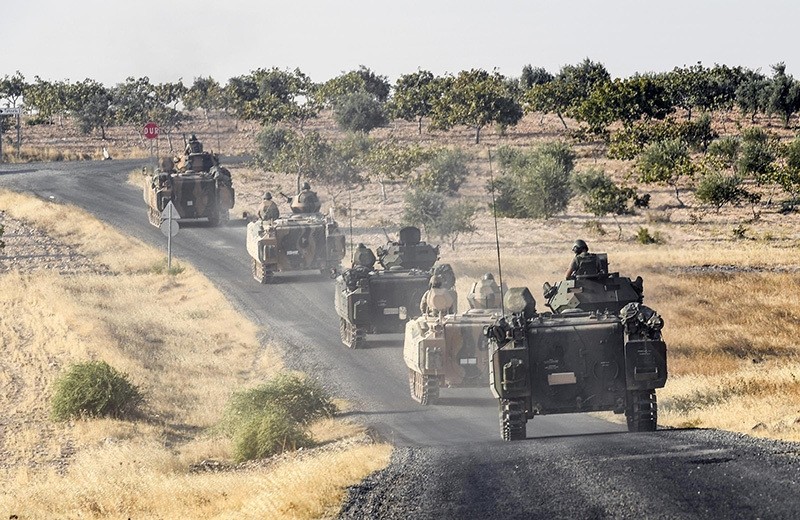
Turkey-backed Free Syrian Army (FSA) fighting against Daesh terrorists, have gained full control of the highway between Syria's al-Bab and Aleppo, while four Turkish soldiers have been killed in clashes, the Turkish military said on Wednesday.
Later in the evening, President Recep Tayyip Erdoğan said that the town had been completely surrounded by Turkish and FSA units as of late Wednesday.
In a meeting with Albanian President Bujar Nishani in the presidential complex in Ankara, Erdoğan said he had just received information from Chief of General Staff Hulusi Akar on Operation Euphrates Shield.
Stating that several Turkish soldiers had been killed and wounded during the last stage of the siege, he said: "I hope Al-Bab will fall soon and the locals of Al-Bab can find a chance to settle in their own territory."
The military had earlier said that four Turkish soldiers were killed, and 15 were injured during clashes with Daesh terrorists.
The statement also indicated that Turkish jets bombarded Daesh positions in al-Bab region between 10:30 and 11:00 am at local time, leaving over 45 Daesh terrorists dead according to estimates. Daesh militants are reported to be evacuating the wounded terrorists following heavy airstrikes, which destroyed 47 shelters used by the terrorists. Heavy ground fightings are ongoing in the region.
Meanwhile, military sources noted that clashes between Turkey-backed FSA fighters and Daesh are taking place near a hospital, which is currently being used as a shelter and ammunition depot by Daesh terrorists.
The Turkish Armed Forces' (TSK) jets destroyed 48 Daesh terrorist targets in Syria, including an armored vehicle, shelters, ammunition depots and command-and-control centers.
The moves are part of Operation Euphrates Shield, which began on Aug. 24 to rid Syria's northern border area of terrorist groups such as Daesh and PYD/YPG. It aims to improve Turkey's security, support anti-Daesh coalition forces and eliminate the terror threat along Turkey's Syrian border using Free Syrian Army (FSA) fighters backed by Turkish armor, artillery, and jets.The TSK-backed opposition fighters have so far liberated more than 1,860 square kilometers from the terrorist group. The aim of the operation is to establish a 5,000 square kilometer terror-free area in northern Syria, comprising the towns of al-Bab, al-Rai, Azaz, Jarablus and Manbij. This would allow Syrians to seek refugee from areas of conflict, as well as ensuring Turkey's southern border is cleared of the terror groups Daesh and YPG/PKK, which constitute a national security threat against Turkey.
The operation has so far liberated the strategic Daesh-held towns of Jarablus, Azaz and Dabiq, and has been nearing the town of al-Bab. The FSA has expanded its operations to al-Bab due to its geostrategic position between the cities of Manbij and Aleppo, while aiming to liberate the people of al-Bab from the Daesh offensive. Moreover, the attempt aims to ensure that the PKK's Syrian offshoot, the Democratic Union Party (PYD), will not be able to connect its cantons from west of the Euphrates River with eastern Kobani, as this would create a territory controlled by a terror group posing an existential threat to Turkey's national security, as well as Syria's territorial integrity.
Turkey has recently announced a new approach to its anti-terror strategy, saying it will fight terror groups at their roots, before they are able to carry out attacks within Turkey's borders. Ankara says that it has particularly employed such a strategy to move from an understanding where it waits for the terror groups to act, to one that cuts the groups' maneuvering ability prior to their attacks against the state. As such, it argues that Daesh, as well as PKK terror threats, must be eliminated from Syria and Iraq before they are able to move into Turkey.
Commenting on Turkey's steps against the Daesh and YPG terror groups in Syria and Iraq, Prime Minister Binali Yıldırım said recently, "Turkey has limited the Daesh threat through Operation Euphrates Shield. We will conduct similar operations on our southern border." Yıldırım's comments, coupled with Turkey's new anti-terror strategy have been understood as a move which would mean an expansion of cross-border operations into northern Iraq, including the Qandil Mountains and Sinjar, to fight PKK targets, in addition to expansion of Operation Euphrates Shield into other PYD-held regions in Syria.
The Democratic Union Party (PYD) and the PKK want to establish a self-declared autonomous canton from Syria's northwestern Afrin to Kobani and Jazeera cantons in the northeast, which moderate opposition groups have opposed as it threatens Syria's territorial integrity. Due to organic organizational links between the PKK and the PYD, Turkey also sees the PYD as a terrorist establishment in its borders, which Ankara has said numerous times it will not allow.
The PKK has used the Qandil Mountains as its headquarters in Iraq, and according to sources, the group is planning to use Sinjar as a stronghold for its operations. On the other hand, amid Turkey's airstrikes against the Qandil Mountains in Northern Iraq, sources have said that northern Syria's Kobani has been used as a training camp for the group's terrorists that have been carrying out attacks in Turkey, most recently in Istanbul, which resulted in the loss of 44 lives, and in the central Kayseri province, which caused the loss of 14 lives. Formed in 1978, the PKK is recognized as a terror group by the United States, Turkey and the EU.
